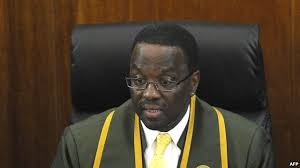Kenya's chief justice denies bribery claims over poll petition
Kenya's Chief Justice Willy Mutunga
on Monday dismissed allegations made by some Kenyans that he was bribed
during the hearing of petitions challenging the election of President
Uhuru Kenyatta.
Mutunga's denial is contained in a statement issued in Nairobi, Mutunga asked Kenyans with any evidence of wrongdoing to petition the Judicial Service Commission (JSC) for his removal and the removal of the five other judges who heard the petitions filed by ex-Prime Minister Raila Odinga and a civil society organization.
``For me the most hurtful allegation was that I had been bribed in the Presidential Petition. I did not know where to turn to in search of a redress. I have never been offered a bribe in my life.
``I have no doubt in my mind that anybody who dares to offer me a bribe, regardless of status, would be the first one I would arrest under the Constitution and the laws of this land,’’ the Chief Justice said.
On April 16, Kenya's Supreme Court judges gave reasons why they upheld the election of Kenyatta as the fourth president, saying Odinga's evidence was insufficient.
In a 113-page ruling, the six-judge bench said they took into account all the evidence submitted by the lawyers representing Odinga and his co-petitioners and resolved that the evidence did not merit nullification of Kenyatta's victory in last month's presidential election.
The country's highest court said that after weighing all the evidence and submissions tabled before it by the petitioners and respondents, it arrived at a conclusion that the election could have been faced by challenges but it could not be perfect.
"We came to the conclusion that, by no means can the conduct of this election be said to have been perfect, even though, quite clearly, the election had been of the greatest interest to the Kenyan people, and they had voluntarily come out into the polling stations, for the purpose of electing the occupant of the Presidential office,’’ the judges said.
However, the ruling sparked public outcry for many Kenyans who’s criticised the judges for expunging evidence which was presented by Odinga.
The East African nation had been waiting for a detailed explanation from the Supreme Court since their initially ruling on March 30.
The Independent Electoral and Boundary Commission (IEBC) declared Kenyatta, the 51-year-old son of Kenya's first president, president with 50.07 per cent of the March 4 vote, enough to avoid a runoff.
The court said that it had already considered the foundations of the main grievances applying to the use of technology in the electoral process.
On Monday, Mutunga said the Judiciary especially the Supreme Court has recently been under attack by Kenyans in what he termed as 'slander, libel, and outright indecent, vulgar, and unacceptable abuses'.
Mutunga's denial is contained in a statement issued in Nairobi, Mutunga asked Kenyans with any evidence of wrongdoing to petition the Judicial Service Commission (JSC) for his removal and the removal of the five other judges who heard the petitions filed by ex-Prime Minister Raila Odinga and a civil society organization.
``For me the most hurtful allegation was that I had been bribed in the Presidential Petition. I did not know where to turn to in search of a redress. I have never been offered a bribe in my life.
``I have no doubt in my mind that anybody who dares to offer me a bribe, regardless of status, would be the first one I would arrest under the Constitution and the laws of this land,’’ the Chief Justice said.
On April 16, Kenya's Supreme Court judges gave reasons why they upheld the election of Kenyatta as the fourth president, saying Odinga's evidence was insufficient.
In a 113-page ruling, the six-judge bench said they took into account all the evidence submitted by the lawyers representing Odinga and his co-petitioners and resolved that the evidence did not merit nullification of Kenyatta's victory in last month's presidential election.
The country's highest court said that after weighing all the evidence and submissions tabled before it by the petitioners and respondents, it arrived at a conclusion that the election could have been faced by challenges but it could not be perfect.
"We came to the conclusion that, by no means can the conduct of this election be said to have been perfect, even though, quite clearly, the election had been of the greatest interest to the Kenyan people, and they had voluntarily come out into the polling stations, for the purpose of electing the occupant of the Presidential office,’’ the judges said.
However, the ruling sparked public outcry for many Kenyans who’s criticised the judges for expunging evidence which was presented by Odinga.
The East African nation had been waiting for a detailed explanation from the Supreme Court since their initially ruling on March 30.
The Independent Electoral and Boundary Commission (IEBC) declared Kenyatta, the 51-year-old son of Kenya's first president, president with 50.07 per cent of the March 4 vote, enough to avoid a runoff.
The court said that it had already considered the foundations of the main grievances applying to the use of technology in the electoral process.
On Monday, Mutunga said the Judiciary especially the Supreme Court has recently been under attack by Kenyans in what he termed as 'slander, libel, and outright indecent, vulgar, and unacceptable abuses'.




Comments
Post a Comment